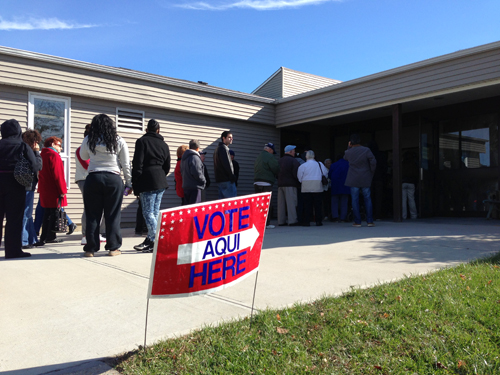Guest spot: A guide to this year’s ballot propositions

Although it’s an off-year election for federal races, this year’s ballot for November 5 is still crammed with local choices for Suffolk County voters.
There are six statewide ballot propositions, and all are amendments to the New York State Constitution for your “Yes” or “No” vote. The League of Women Voters takes no position on any of them (or on any candidate running for office). But we hope the following summaries will help you navigate the ballot on November 5, with lots more information available at LWVNY.org.
Proposal Number One: Casino Gambling. A “Yes” vote would allow up to seven additional casino sites within the state to promote job growth, increase aid to schools and permit local governments to lower property taxes through the generation of revenue, as the wording of the proposition states.
Proponents argue that gambling, which already exists within the state at five Native American-owned venues and nine racetracks, would allow the state to benefit from tourism, revenue and job opportunities. They argue that the limit of seven facilities ensures there will not be an excessive proliferation of casinos within the state. Opponents argue that the expansion could contribute to gambling addiction, increase crime associated with gambling and that the revenue projections are overstated. They also mention infrastructure issues, including increased traffic.
Proposal Number Two: Civil Service Benefits for Disabled Veterans. A successful “Yes” vote would provide disabled veterans additional credit on civil service exams, creating an exception to the one-time-only additional credit rule. Veterans already receive extra credit and could qualify for an additional one after certification of their disability.
Proponents say this amendment would increase the likelihood of veterans being hired in civil service jobs and put their experience and training to work for the state and local governments. The League of Women Voters has not identified any organizations that have expressed opposition to this amendment.
Proposal Number Three: Municipal Sewer Debt. In excluding sewer debt from constitutional debt limits, the third amendment seeks to enable municipalities to undertake and finance needed improvements in their waste treatment infrastructure without piercing their indebtedness ceiling.
Noting that significant water pollution issues still exist, proponents of this amendment believe that by extending these provisions until January 1, 2024, municipalities would have the opportunity to take advantage of new technology and upgrade existing facilities as needed without impairing their ability to finance other capital requirements. The League of Women Voters has not identified any organizations that have expressed opposition to this amendment.
Proposal Number Four: “Forever Wild.” The “Forever Wild” clause in the New York State Constitution forbids the lease, sale, exchange or taking of any forest preserve land. The amendment on November’s ballot would allow the legislature to settle 100-year-old disputes between the state and private parties over ownership of land located in Long Lake, Hamilton County, by giving up the state’s claim on disputed parcels. In exchange, the state would get other land of equal or better value, currently under private ownership, that would be incorporated into the forest preserve.
Proponents of this amendment purport that it would remove the uncertainty and cost around this long-standing dispute while making significant additions to the forest preserve. Opponents argue that a legislative settlement would set a poor precedent for other land disputes in the Adirondack Park and that these disputes should be settled via the judicial system.
Proposal Number Five: “Forever Wild.” Related to the above proposal, this amendment would permit the Legislature to convey approximately 200 forest preserve acres to NYCO Mining. In exchange the company would give the state at least the same amount of land, assessed at a minimum of $1 million, to be added to the preserve. When NYCO finishes its mining efforts, it would restore the land to its original condition and return it to the preserve.
This is a complicated amendment with vocal opponents and proponents. Those in favor of the lease deal say it will preserve jobs and ensure the survival of a large county employer, provide new access to recreational land, and ultimately result in the state acquiring a greater quantity of higher quality land. On the other side, opponents argue that the land swap is not vital to NYCO’s survival and it would seriously diminish the strength of the “Forever Wild” clause. They cite concerns over setting a dangerous historic precedent, as this would be the first forest preserve amendment undertaken for commercial gain rather than clear municipal purpose or public benefit.
Proposal Number Six: Judges’ Retirement Age. This final amendment increases to 80 the maximum age that Justices of the New York Supreme and Appellate Courts may serve. New York State Supreme Court Justices are currently required to retire at age 70 but are eligible for three additional two-year terms. A State Appellate Court Justice can remain in service for up to 10 additional years in order to complete the term to which that judge was appointed. The amendment would also prohibit the appointment of any person over the age of 70 to the Court of Appeals.
Proponents argue this change would allow the state judiciary to continue to benefit from the service of many experienced and productive judges and that mandatory retirement age is archaic. Some amendment opponents feel that the proposal unfairly favors high-level judges on both courts, while others argue that forced retirement encourages diversity.
Lois B. Morris is the president of the League of Women Voters of Shelter Island.


